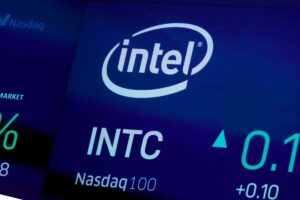Intel’s Journey: A New Chapter with Semiconductor Giants
In a striking turn of events, Intel (INTC) saw its stock surge nearly 3% on Wednesday, thanks in part to reports swirling around discussions between Taiwan Semiconductor Manufacturing Company (TSMC) and a consortium of influential chipmakers, including Nvidia (NVDA) and AMD (AMD), regarding the potential acquisition of Intel’s chip manufacturing business. This news raises questions about the future trajectory of one of the tech industry’s behemoths and its strategy in an increasingly competitive landscape.
What’s Happening at Intel?
According to a recent Reuters report, the proposed consortium could take over Intel’s foundry business, which is crucial for producing chips not only for Intel itself but also for third-party clients. This move comes on the heels of Intel’s staggering net loss of $18.8 billion in 2024, with its foundry segment suffering an operating loss of $11.6 billion. These numbers underscore the challenges Intel faces as it attempts to regain its footing in the chip manufacturing arena.
Despite a modest uptick of 1.6% in share price year-to-date, a sobering statistic remains: Intel’s stock has plummeted 54% over the past year. While Wednesday’s news may provide a brief respite, stakeholders are closely watching for any signs of a more substantial turnaround.
The Bigger Picture: Industry Dynamics
Nvidia, while a leader in AI chip technology, is experiencing its own rollercoaster—facing a 14% decline in stock value year to date. Concerns about the longevity of the AI boom, coupled with potential tariffs and export controls, are weighing heavily on investor sentiment. However, it’s noteworthy that Nvidia’s shares have risen by 24% over the past year, indicating a robust long-term outlook even amid uncertainty.
The ripple effect of these developments was evident, as shares for TSMC, Broadcom (AVGO), and Nvidia also experienced gains following the Intel news. The interconnectedness of these companies highlights a broader trend where collaboration among industry titans could redefine market positions.
The Geopolitical Landscape
Amidst these corporate maneuvers, it’s essential to consider the geopolitical landscape. The Trump administration has actively sought to bolster Intel’s standing in the U.S. semiconductor manufacturing sector, which, alarmingly, has seen U.S. share of global chip production drop from 37% in 1990 to just 12% today. The dependence on foreign production, particularly in light of potential conflicts in Taiwan, has sparked debates about national security and economic sustainability.
The pandemic served as a stark reminder of the fragility within the supply chain, with chip shortages affecting everything from smartphones to vehicles, pointing to a critical need for domestic manufacturing capabilities.
Looking Ahead
Intel’s prior efforts under former CEO Pat Gelsinger aimed to transform its foundry segment into a formidable player, rivaling TSMC’s operation. However, these ambitions were slow to materialize. Following Gelsinger’s ousting last year, current co-CEOs David Zinsner and Michelle Johnston Holthaus are left to navigate the company through a challenging landscape, seeking a permanent replacement for Gelsinger as the board re-evaluates its strategies.
In a bid to strengthen its position, Intel—along with TSMC—has benefited from the CHIPS Act, which has injected billions into new manufacturing facilities in the U.S. TSMC’s recent announcement of a $100 billion investment in Arizona, in addition to its previous commitment of $65 billion, signals a robust effort to bolster domestic production.
Conclusion
As the semiconductor industry continues to evolve, the spotlight remains on Intel and its strategic decisions. The potential collaboration with TSMC and other major players could reshape not only Intel’s future but also the broader landscape of chip manufacturing. The convergence of politics, technology, and market dynamics provides a complex but compelling narrative that investors must keep a close eye on.
At Extreme Investor Network, we’ll continue to bring you in-depth analyses and updates on developments in the financial and tech sectors, empowering you to make informed investment decisions in these rapidly changing times.

